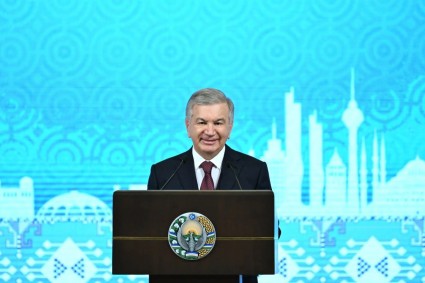The red carpet spread out for President Shavkat Mirziyoyev in the Pakistani capital this week not only reflected on the depth of cultural and historic roots between the two countries but it also demonstrated the will of the people of Central Asia and South Asia to overcome all hurdles hampering the path of their mutual connectivity.
The expression of this will is not a time-barred or event and country specific happening. Rather, the people and governments of the regional countries have always shown their earnest desire to further expand their political, diplomatic, economic, trade and cultural relationship and people-to-people connectivity.
It was under the same spirit that during the two-day visit of President Mirziyoyev to Islamabad, Pakistan and Uzbekistan signed two agreements, one Action Plan, and five Memorandums of Understanding for boosting bilateral cooperation in diverse fields.
Preferential Trade Agreement (PTA) has always been a dream of the people of the two regions. By signing this agreement, Abdul Razaq Dawood, Advisor of Pakistan’s Prime Minister on Commerce, and Sardar Umurzakov, Uzbekistan’s Deputy Prime Minister and Minister for Investment and Foreign Trade, positively responded to that wish of the people and trade communities of the two countries.
If the prevailing impediments in the path of bilateral trade are removed and steps are taken to ensure the use of Afghanistan’s soil as a conduit for trade and transit between the two countries, the PTA will not only lead to a win-win partnership between Uzbekistan and Pakistan but will also equally benefit Afghanistan.
In fact, trade and transit between Pakistan and Uzbekistan will open a new avenue of fruitful interaction and connectivity between South Asia and Central Asia. A major step in this connection is the proposed construction of Termez-Mazar-e-Sharif-Kabul-Peshawar Railway Corridor.
It is heartening that during their meeting in Islamabad, President Mirziyoyev and Prime Minister Imran Khan acknowledged the important role of this project and reaffirmed their commitment to its construction. They agreed to evolve a Road Map involving measures to develop feasibility study and start construction work on the project.
Pakistan’s Ministry of Railways and the Uzbek Ministry of Transport also signed a Memorandum of Understanding for promotion cooperation in this regard.
The Railway Corridor and connectivity issues are so pressing for the regional countries that they occupied central place in the agenda of talks when Afghanistan’s Deputy Prime Minister Abdul Salam Hanafi visited Uzbekistan and held talks with Yusup Kabulzhanov, the representative of the Uzbek Foreign Ministry, in Termez, late last year.
These topics, besides the pressing issue of security, were also discussed in talks between the Uzbek Foreign Minister Abdulaziz Kamilov and his Afghan counterpart, Amir Khan Muttaqi in Kabul several months ago.
During President Mirziyoyev’s visit to Islamabad, Pakistan and Uzbekistan also signed an agreement of cooperation between the radio and televisions of both the countries. This agreement will go a long way in further promoting cultural interaction and media-to-media contacts between the two countries.
Cultural relations between the two sides are so important that on this occasion, Prime Minister Imran Khan also announced a plan to make a film on the life of Zaheeruddin Babar, the first king of India’s Mogul dynasty, who had his roots in Farghana Valley between the present day Uzbekistan-Tajikistan and Kyrgyzstan.
In fact, all the Turk and Mongol kings of India had forced their way into South Asia from Uzbekistan and other parts of Central Asia.
South Asian Muslims not only had their political roots in Central Asia but religiously too, they have been deeply connected to the region. Historians agree that Islam had come to most parts of the Indian Subcontinent, not from the Arabian Peninsula directly, but from Central Asia.
The Muslims of India, Pakistan and Bangladesh still consider Bukhara and Samarqand as their sacred Islamic cities from where Islam was spread throughout the region. Imam Muhammad ibn Ismail al-Bukhari is still revered as a great Islamic personality in Afghanistan, Pakistan and India.
These cultural and religious roots need to be revived to cement the fraternal relations between the people of the two regions.
The leadership of Pakistan and Uzbekistan appeared to be quite vigilant to this reality. That is why during this latest visit of President Mirziyoyev, Uzbekistan and Pakistan singed a Memorandum of Understanding for promotion of pilgrimage tourism.
Undoubtedly this kind of tourism and promotion of cultural relations are inevitable to bring the two people closer to each other.
While there is a strong wish in both Pakistan and Uzbekistan to mutually benefit from enhanced bilateral cooperation in diverse fields, there is also a realization on both sides that none of these goals can be achieved without the cooperation of Afghanistan and before restoration of a lasting peace in that country.
That is why in their joint statement after their delegation-level talks in Islamabad, President Shavkat Mirziyoyev and Prime Minister Imran Khan ‘agreed to continue humanitarian assistance to Afghanistan and emphasized that peace and stability in Afghanistan is essential to advance the connectivity agenda for regional prosperity.’
An unignorable aspect of President Mirziyoyev’s trip to Islamabad is that besides the civilian government of Pakistan, the country’s military leadership remained fully supportive to expansion of the country’s friendly relations with Uzbekistan.
It may not sound important for those not familiar with the Pakistani statehood but, frankly speaking, endorsement from the military is a guaranteed to the success of any undertaking by the civilian government.
Prior to President Mirziyoyev’s visit, Pakistan’s Army Chief, General Qamar Javed Bajwa held meeting with Uzbek Ambassador Aybek Arif Usmanov in Rawalpindi at which both sides expressed their ‘desire to further enhance bilateral relations.’
Abdul Hadi Mayar
Islamabad-based journalist covering South Asia-Central Asia affairs















